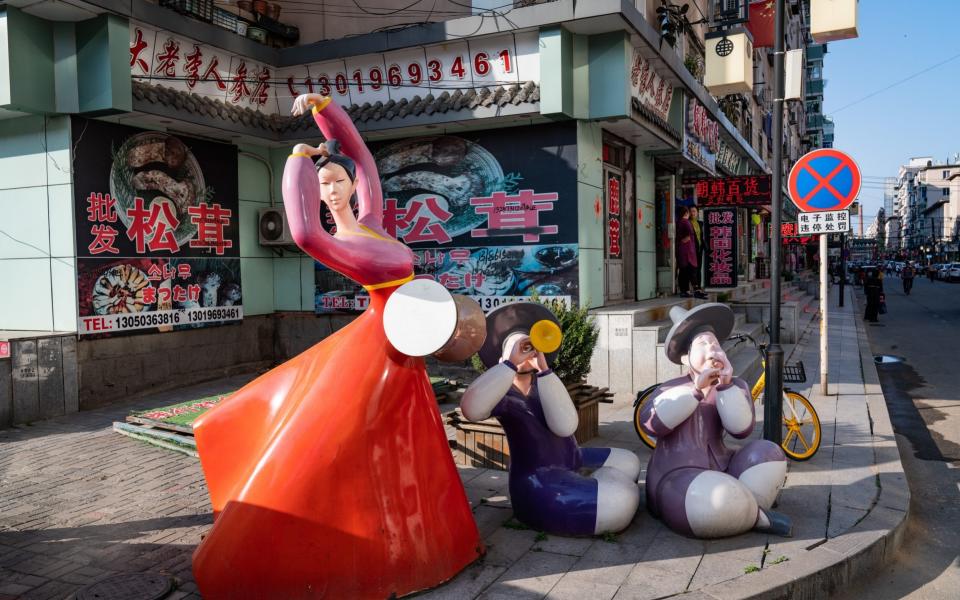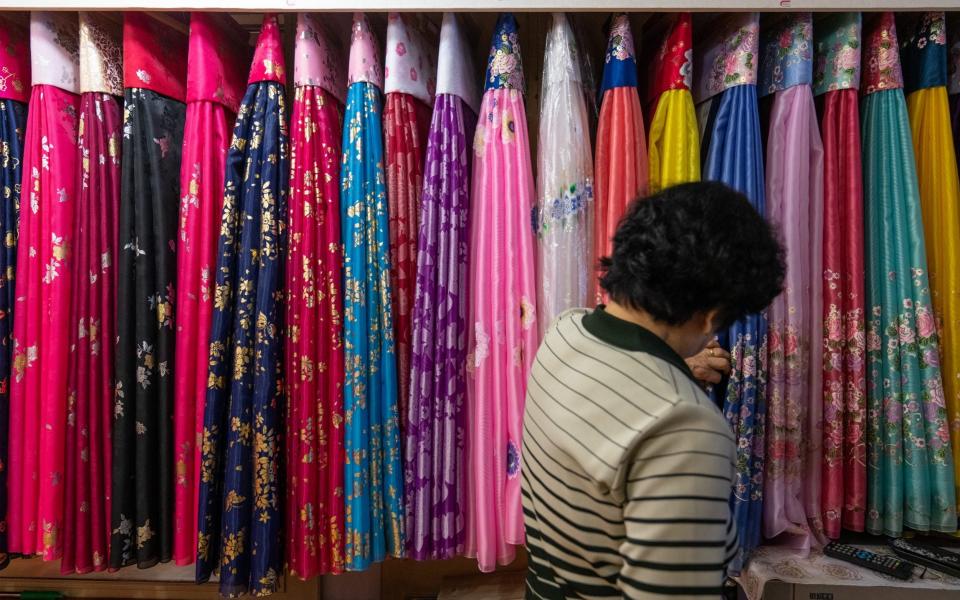What a bridge on North Korea's secret border says about China's cold war with the West

In the middle of a bridge soaring over the Yalu River in northeast China is a white line painted on the ground, flanked by surveillance cameras, traffic lights and a blue sign indicating the destination ahead: North Korea.
For now, the crossing in the border city of Dandong remains quiet, though it’s poised to soon become busy with traffic.
Workers began conducting safety inspections last week – preparations that suggest the long-delayed New Yalu River Bridge may soon open, allowing official trade to resume between China and North Korea, which closed its borders after the coronavirus outbreak emerged in Wuhan. It was one of the first countries in the world to do so, given concerns its public health system would buckle if mass disease spread.
“We’ve been here for a few days already and will probably be here until early June,” an inspector told the Telegraph in mid-May. He is on a team of eight that will soon cross to the North Korean side to examine the bridge, though officials from both sides are still negotiating terms.
China has reaffirmed its alliances with nations including North Korea and Russia after the US began pursuing more multilateral engagement. Under President Joe Biden, the US has ramped up efforts to court Asian allies, including Japan and South Korea, in efforts to bolster cooperation on the North Korean nuclear threat and China’s growing influence.

On Friday, Mr Biden will welcome South Korean President Moon Jae-in to Washington for an official visit. The meeting could shed light on the US approach, as the Biden administration has been reviewing how to deal with North Korea – with more sanctions, summits or both.
The visit also comes as ties between Washington and Beijing have frayed, potentially making China less inclined to collaborate on dealing with North Korea – even though its leaders are concerned about the nuclear threat.
China’s ties to the North helped to blunt the impact of United Nations sanctions meant to deter Kim Jong-un’s nuclear ambitions. Smuggling routes and legal trade along the 880-mile border supplied North Korean markets and factories with building materials, machine parts, fuel, food and consumer goods.
But the North’s decision to seal its border over coronavirus concerns has been crippling. From January 2020 through the first quarter of this year, China’s official trade with North Korea crashed to $550 million (£400 million), compared to $2.8 trillion in 2019. Chinese exports to North Korea dropped to $3,000 in February, the lowest in years.
“Clearly the situation inside, in North Korea, is dire, so it stands to reason we’re at a point that some relaxation (of the border closure) might happen,” said Scott Snyder, senior fellow for Korea Studies at the US-based Council on Foreign Relations.
Re-opening trade with China could also indicate that North Korea may ramp up weapons testing again, after a relatively quieter period during the coronavirus pandemic.

”They’re not testing not because they’ve had a change of heart, but because they’re dealing with domestic crises,” said John Park, director of the Korea Project at Harvard University’s Kennedy School of Government. “They hit the pause button, and if they stabilise and are going to open up bits of trade, that’s a sign they’ve figured out a way to manage this.”
Then, “does that mean they take their fingers off the pause button? Does that mean they go back to doing what they said they were going to do before Covid, and that was to demonstrate more potent capabilities?”
North Korea has recently again started using shows of force, firing off two short-range ballistic missiles in March – its first such launches in a year, and in defiance of UN Security Council bans on ballistic missile tests.
Rumours among traders in Dandong on when border crossings might be allowed again range from next month to early next year. Exactly when depends on the North’s risk appetite with coronavirus. Officially, Pyongyang has told the World Health Organisation that it has had zero cases, though experts doubt the veracity of its claims.

Either way, there are signs in the city – spliced from the hermit kingdom by the Yalu River, lined with watchtowers and border guards with guns and masks – that China is laying the groundwork for trading with North Korea.
The government of Liaoning province, where Dandong is located, invited bids in March for the safety inspection the Telegraph found was underway. Official procurement documents said that the New Yalu River Bridge – a three-kilometre stretch connecting China to North Korea – was “about to be put into operation".
Another tender notice, also from March, sought contractors to build a cargo inspection area, logistics warehouse and other facilities to support port operations on the Chinese side of the bridge.
Many in Dandong are eager for the border to re-open and activity to resume.
Three street vendors told the Telegraph that they were running out of smuggled North Korean cigarettes to sell. Few restaurants stock Taedonggang, a beer produced by a state-owned North Korean brewery.

Shopkeepers, desperate to make a sale, are quick to offer discounts to passersby – soaps, perfumes, noodles, handbags, and vitamins that North Koreans going back and forth used to buy.
An elderly woman who tailors traditional Korean robes was praying in her shop one morning for customers to return.
Before the border closure, North Koreans would place large orders for colourful outfits ranging from 170 yuan (£20) for children to 3,600 yuan (£400) for high-end women’s dresses. But these days she’s lucky to sell smaller textiles, such as makeup pouches for 10 yuan (£1.10) each, to Chinese tourists.
“Business has been terrible,” she said, making it difficult to cover her monthly shop rent of 3,000 yuan (£330). “I hope the border opens soon.”
